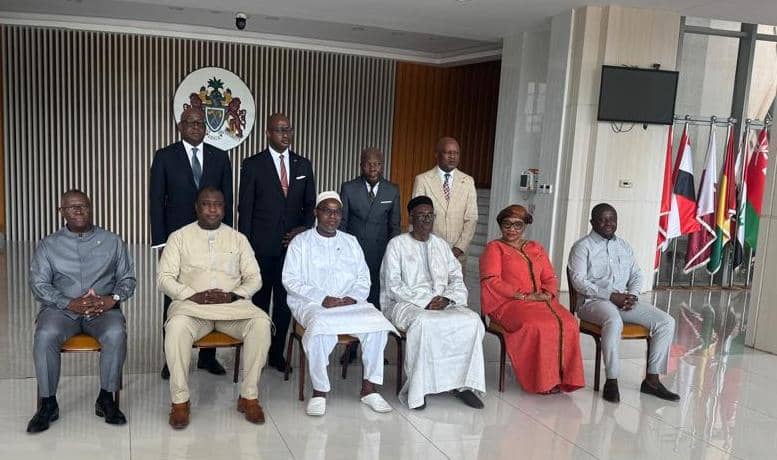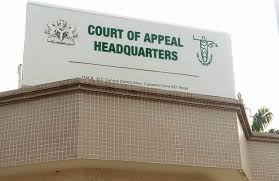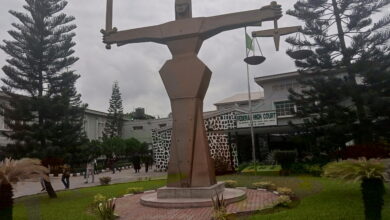
Banjul, The Gambia – ECOWAS Ministers of Justice are set to validate two critical instruments of the Community Court of Justice, ECOWAS during their Ministerial Meeting holding in Banjul, The Gambia from 29 – 30 August, 2025.
The meeting convened under the auspices of the ECOWAS Commission and hosted by the Government of The Gambia, follows four days meeting of regional experts for the review of the Draft Harmonised Protocol and the Draft Arbitration Rules of the Court.
H.E. Muhammed B.S. Jallow, Vice President of the Republic of The Gambia, welcomed delegates on behalf of the President, H.E. Adama Barrow.
He described the meeting as a “historic milestone” in consolidating the Court’s mandate.
He noted that the new Arbitration Rules will enable the ECOWAS Court to provide a credible regional mechanism for resolving commercial disputes, thereby strengthening investor confidence and supporting the objectives of the African Continental Free Trade Area (AfCFTA).
On his part, H.E. Alpha Sesay, Attorney General and Minister of Justice of Sierra described the Court as “a beacon of justice and a symbol of our collective commitment to regional integration and the rule of law’.
‘Our work here will have significant impact on the role that the Court continues to play in the sub-region and will strengthen access to justice for our citizens. Through this, we honour our duty to the protection of human rights, promotion of regional integration, and the resolution of disputes through arbitration”, the Chair of the ECOWAS Ministers of Justice added.
Read Also: ECOWAS Member States Reach Landmark Agreement to Strengthen Enforcement of Regional Court Judgements
Delivering his keynote address, H.E. Dawda A. Jallow, Attorney General and Minister of Justice of The Gambia, underlined the importance of equipping ECOWAS with arbitration tools comparable to international standards.
He stressed that the Community Court of Justice has the potential to become a continental hub for arbitration and reaffirmed the need to empower it to address both human rights and economic disputes within the region.
In his remarks, Hon. Justice Ricardo Cláudio Monteiro Gonçalves, President of the Community Court of Justice, said that the Harmonised Protocol reflects “lessons learned over more than two decades of judicial practice” and ensures alignment with the Revised ECOWAS Treaty and decisions of the Authority of Heads of State and Government.
He stressed that the Protocol will “reinforce the Court’s ability to discharge its mandate effectively,” while safeguarding the principles of justice, equity, and human rights that underpin the ECOWAS integration project.
He added that the adoption of these instruments will shape the future of the Court and strengthen the credibility of the ECOWAS legal order.
Madam Miatta Lily French ECOWAS Resident Representative to The Gambia commended the President of the Court and his team for the initiative to ensure the work of the Court is made less cumbersome, and to enhance the effectiveness of the Court.
Also Read: ECOWAS Moot Court Competition Concludes, Paving Way for Regional Legal Excellence
The ECOWAS Ministers reaffirmed their commitment to ensuring that the adoption of the Harmonised Protocol and Arbitration Rules strengthens the Community Court of Justice to deliver on its mandate and advance regional integration.
The instruments, once validated by the Ministers, will be submitted to the Authority of Heads of State and Government for adoption.
Their entry into force will enhance the Court’s effectiveness in safeguarding human rights, promoting rule of law, and supporting economic integration across West Afrrica
The Harmonised Protocol integrates years of fragmented amendments into a single comprehensive text that defines the Court’s composition, jurisdiction, procedures, and enforcement mechanisms.
The consolidation aims to eliminate inconsistencies, streamline judicial processes, provide better clarity and greater legal certainty to Member States and citizens. While the Arbitration Rules will serve as a regional mechanism for commercial and investment dispute resolution.







